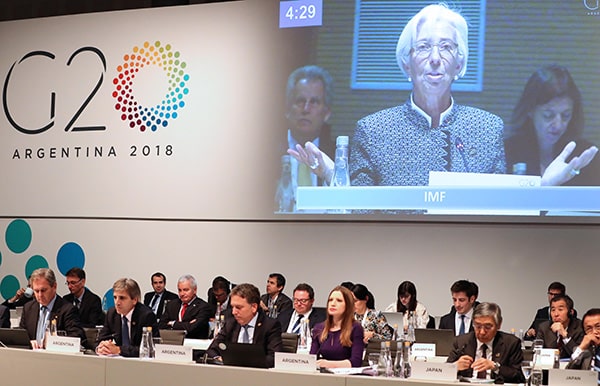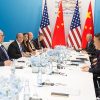
The G20, which accounts for 85% of the world’s GDP, 80% of its trade and two thirds of its population, is not an institution as such but a mechanism for coordinating and driving policies. Since the financial crisis that erupted 10 years ago, it has used its summits of heads of state and government leaders to coordinate a policy of financial stability and stimuli for a recession that predominantly afflicted the developed world. This persisted until the weakening of common interests led to a shift towards austerity among some of its European members. Since then the G20, which this year is under the presidency of Argentina with Spain participating as a permanently-invited member, has done less, but is taking on more. Its agenda has become increasingly broader, arguably at the expense of focus. What should it concentrate on?
Dennis Snower, President of the German foundation Global Solutions, proposes some main areas that the G20 should prioritise: they are those that involve global goods and resources, inequalities and the most nefarious social divides. Prominent among global goods are multilateralism, international trade, the environment, social cohesion and a new social contract for the digital era, technology and its dissemination between and within countries including some attempt to secure technological justice, general education for this Fourth Industrial Revolution, and a stable and just financial system, among others. Clearly if this is to be achieved it is necessary to abandon nationalism, unilateralism and the politics of ‘me first’. It may be worth adding to this dimension its obverse, the fight against common ills, such as corruption, global warming, pollution of the atmosphere and oceans, pandemics, terrorism and the proliferation of weapons of mass destruction, although the G20 does not particularly concern itself with matters of security. It is, however, an opportunity for closing ranks, something that can also be used against a recalcitrant Trump, and despite the fact that Argentina and President Macri, who will be chairing the summit, need the bilateral support of the US and the IMF in their times of crisis.
Many of these issues have been debated in Buenos Aires at the summit of the T20, the G20’s network of think tanks, which includes the Elcano Royal Institute as a member. The manifold conclusions of months of hard work point to three priorities: (1) that the G20 should initiate a dialogue to redesign the World Trade Organisation (WTO) in order to safeguard an open world (thereby once again involving the US with Trump); (2) that it should play a central role in the fight against climate change and fulfilment of the Paris agreement; and (3) that it should promote a new social contract for these digital and unequal times, one that also satisfactorily addresses, among other things, the gender gap, all in a representative, diverse and flexible way.
There are of course stumbling blocks, quite apart from Trump. One is that this type of governance requires diverse global narratives with long-term visions that connect with people. For years, since the 1980s, there has been only one, the neoliberal vision. Another issue, raised by a Chinese participant, is whether an essentially Western system can accommodate non-Western countries, whether it can accommodate a ‘diversity of modernities’. Perhaps it can, if the more individualistic values are replaced globally by other more communal, more Asian, alternatives. A third stumbling block is that thinking and action can and should be conducted globally, but politics is still local, essentially national.
Traditional politics is no longer up to the task of course, still less when in a large part of the world –certainly in the West– there is a widespread crisis of trust in politicians and institutions. Moreover, there has been an enfeeblement in the capacity to govern at all levels. It is not that there is no capacity to avoid a new crisis such as the one in 2008, it is rather that there would be no capability to resolve it if it occurred. Whatever happens, it is necessary to incorporate into this governance a dimension that might be called inductive, from the bottom up, with more actors, drawn from civil societies and citizens, the cities and the businesses that are creating new realities. This is the only way to ensure that a more complex and diverse world is rendered more governable. The G20 is not the framework for such governability, but it can drive it forward.


